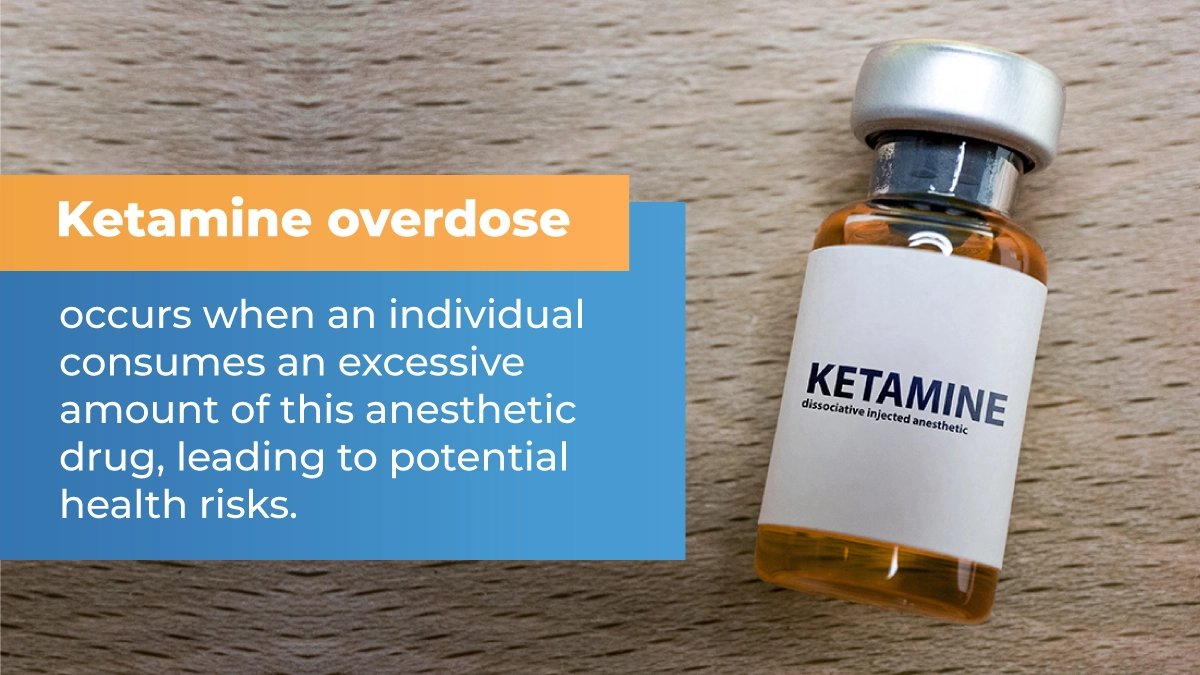
Effectiveness Of Medication-Assisted Treatment
Explore the effectiveness of medication-assisted treatment with The Recovery Team-Newton.

Ketamine overdose occurs when an individual takes more of this anesthetic and dissociative drug than the body can safely process. In overdose situations, the body faces an excessive amount of ketamine, disrupting its normal functioning and leading to potential health risks.
Ketamine overdose manifests in various symptoms affecting both the mind and body, ranging from mild to severe.
Ketamine overdose is a serious health concern that requires immediate medical attention. Here is what you need to know:
Embark on a journey toward recovery from substance use disorder (SUD) with The Recovery Team-Newton. Call (508) 978-2772 for more information.
Ketamine is a dissociative anesthetic drug approved by the United States Food and Drug Administration (FDA), used in medical settings for inducing and maintaining anesthesia.
Apart from its legitimate medical uses, ketamine has been employed off-label for managing treatment-resistant depression (TRD), post-traumatic stress disorder (PTSD), bipolar disorder, and chronic pain relief.
However, ketamine is also known for its recreational use, where it can be abused for its hallucinogenic and dissociative effects. Ketamine is used as a party drug and sometimes referred to as “Special K,” “Vitamin K,” “Cat Valium,” or “Kit Kat” when used recreationally. Misuse or abuse can lead to overdose.
A ketamine overdose occurs when an individual takes higher doses of ketamine than their body can handle. Overdosing on ketamine can lead to serious health complications and, in extreme cases, may be fatal. There is a higher risk of overdose when ketamine is used for recreational purposes and in larger-than-prescribed doses.
Therefore, as with any medication, ketamine should only be used under the supervision of a qualified medical professional and following prescribed guidelines.
Overdosing on ketamine manifests in the form of various symptoms, varying from person to person. Here are some common signs of ketamine overdose:
In cases of a ketamine overdose, individuals may exhibit various physical symptoms, such as:
Psychological symptoms of ketamine overdose can manifest as:
If you suspect someone is experiencing a ketamine overdose, call for emergency medical care immediately. Always prioritize professional medical advice and assistance in these situations.
Ketamine, a prescription medication, can pose significant short-term and long-term health consequences when misused. Here is the breakdown of these significant risks:
Ketamine, originally developed as an anesthetic, is now a popular recreational drug. However, its misuse poses significant short-term health risks. In the case of overdose, individuals may experience immediate respiratory distress, leading to hypoxia or even respiratory failure.
In addition, ketamine overdose can cause cardiovascular issues, such as elevated blood pressure and heart rate, putting strain on the cardiovascular system. Severe cases may lead to dangerous complications like arrhythmias.
Psychologically, a ketamine overdose can induce hallucinations, delirium, and dissociation (known as “k-hole”). Individuals may become disoriented, confused, or experience a loss of perception of reality. This disconnection from one’s surroundings can lead to accidents, severe injury, and self-harm.
While acute overdose events are concerning, the long-term consequences of chronic ketamine misuse are equally alarming. Prolonged use may result in urinary and bladder problems, a condition commonly known as “ketamine bladder syndrome.” Chronic inflammation of the bladder and urinary tract can lead to pain, difficulty urinating, and, in severe cases, irreversible damage to the urinary system.
Psychiatric implications are also associated with long-term ketamine use. Individuals may develop tolerance, dependence, and addiction, leading to a cycle of compulsive drug-seeking behavior. Withdrawal symptoms emerge with sudden cessation of ketamine after long-term use.
Chronic ketamine abuse has also been linked to cognitive impairments, affecting memory, attention, and executive functions. Furthermore, persistent psychological issues such as anxiety and major depression may manifest, complicating the overall mental health of the individual.
When faced with a suspected ketamine overdose, prompt and appropriate actions can make a major difference in ensuring the individual’s well-being. Here are essential steps to follow in an emergency:
The first and most critical step is to call 911. Communicate clearly and provide information about the situation, emphasizing the suspected ketamine overdose. Medical emergency responders are equipped to handle these situations and can provide guidance while on their way.
While waiting for emergency services, monitor the individual’s vital signs. Keep an eye on their breathing, heart rate, and consciousness levels. If there are any signs of respiratory problems or loss of consciousness, be prepared to initiate CPR if you are trained to do so.
Maintaining a calm environment is essential for the well-being of the person experiencing the overdose. Limit external stimuli, such as loud noises or bright lights, to reduce potential distress.
Stay with the person at all times. Ketamine overdose can induce confusion and disorientation, making it crucial to provide reassurance and prevent potential accidents or self-harm.
Avoid attempting any home remedies or administering substances to counteract the effects of ketamine. Only medical practitioners can assess the situation accurately and provide appropriate interventions.
When emergency services arrive, provide them with as much information as possible. Share details about the quantity of ketamine consumed, the time of ingestion, and any co-occurring mental health conditions. This information assists medical professionals in tailoring their responses to the specific situation.
These measures contribute to a safer and more effective response, prioritizing the individual’s health and well-being.
Embarking on a journey to overcome ketamine addiction is a courageous step, and you don’t have to face it alone. The Recovery Team-Newton stands ready to help you get on the road to lasting recovery.
Our day treatment programs offer a blend of comprehensive addiction treatment services, including medication-assisted treatment (MAT), expert medication management, dual diagnosis support, and holistic modalities. Your well-being is our priority.
Take the first step towards recovery—call us now at (508) 978-2772 for more information.
The most common symptoms of a ketamine overdose include impaired motor function, confusion, hallucinations, elevated heart rate, difficulty breathing, and dissociation. Recognizing these signs is vital for prompt intervention and seeking medical assistance.
If you overdose on ketamine, call 911 immediately. Stay with someone, monitor vital signs, and keep the environment calm. Do not attempt home remedies. Providing accurate information to medical professionals upon their arrival is crucial for effective treatment.
Ketamine should only be used under medical supervision and as prescribed. Frequent recreational use or taking high doses of ketamine can lead to health risks, including addiction and potential overdose. It is essential to follow medical advice and not self-administer ketamine.

Explore the effectiveness of medication-assisted treatment with The Recovery Team-Newton.

Explore the examples of dual diagnosis and its treatment plans for better outcomes with The Recovery Team-Newton.

Explore how long drug rehab programs are with the complete guide from The Recovery Team-Newton.